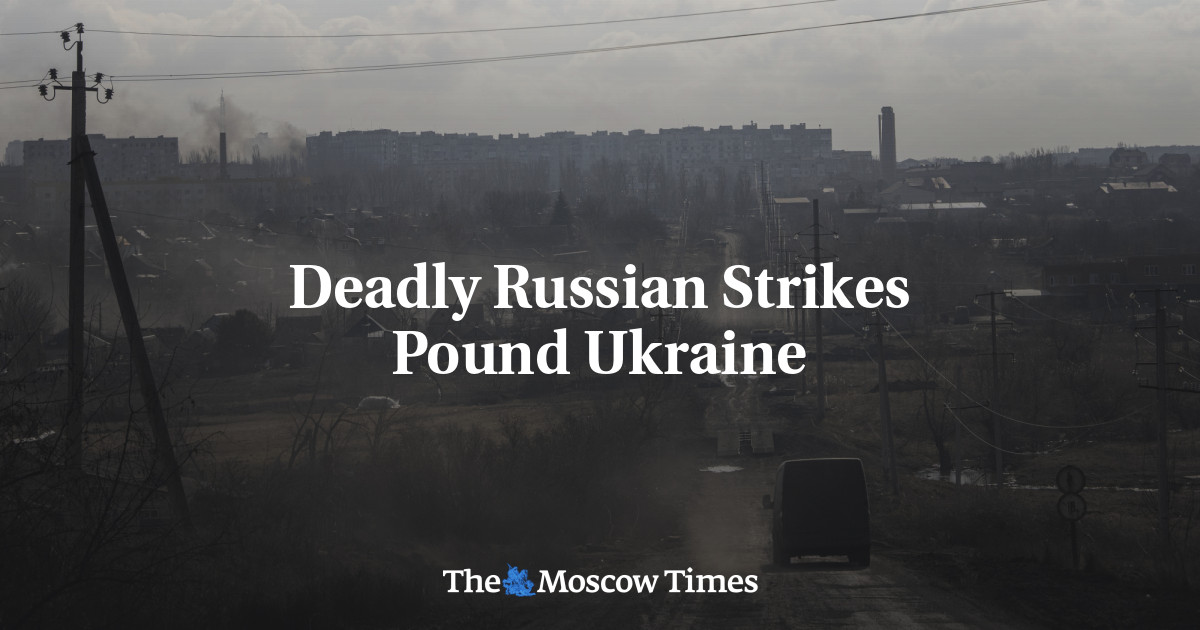
The largest Russian strikes on Ukraine in weeks killed at least six people and caused power outages across the war-battered nation on Thursday.
Kyiv’s military downed nearly half of the missiles launched by Russia over at least 10 regions, as the fight raged on for control of the symbolic prize Bakhmut in Ukraine’s east.
The deadly Russian barrage on Thursday struck the relatively peaceful Lviv region in Ukraine’s west and left second-city Kharkiv without power, water or heating.
“The enemy fired 81 missiles in an attempt to intimidate Ukrainians again, returning to their miserable tactics,” Ukrainian President Volodymyr Zelensky said.
For months Russia has been pummelling key facilities in Ukraine with missiles and drones — disrupting water, heating and electricity supplies for millions of people.
Kyiv Mayor Vitali Klitschko said two people were injured and 15% of households were without power and 40% without heating following explosions in two areas of the Ukrainian capital.
On Prospekt Peremogy, or Victory Prospect, in the west of Kyiv, three cars parked near a high-rise apartment building were charred and several others damaged by an attack, an AFP reporter saw. The ground was littered with shattered glass from windows.
“Our windows look onto that side. There was a really loud crash,” said local resident Igor Yezhov, 60, a car dealer originally from Russia.
‘Frightening’
“I was very scared, of course, although we have quite a solid building, made of reinforced concrete. All the same it was frightening.”
“It’s fate. People come out at seven to go to work. No one expects such (strikes). When there’s an air raid siren you need to be more attentive.”
The governor of Ukraine’s western Lviv region said that the bodies of five people had been found in rubble after a missile hit their house, while the governor of the eastern Dnipropetrovsk region said that a 34-year-old man had been killed.
Ukraine’s nuclear energy operator said the strikes had also cut off the electricity supply to the Zaporizhzhia nuclear power plant, which is controlled by Russian forces and is Europe’s largest.
For the sixth time since it was taken over, the facility is now operating on diesel generators which have an autonomy of 10 days.
“The countdown has begun. If it is impossible to renew the external power supply of the station during this time, an accident with radiation consequences for the whole world may occur,” Energoatom said.
There were also strikes reported on energy plants in several other parts of Ukraine, including Kharkiv in the northeast and the region of Odesa in the southwest.
In the Kharkiv region, located on the border with Russia, Governor Oleh Synehubov said there had been 15 strikes targeting “critical infrastructure facilities.”
In the region’s main city of Kharkiv, Mayor Ihor Terekhov said the city had been left entirely without mains power, water and heating on Thursday morning and was using generators.
Bakhmut may fall
In the Odesa region, Governor Maksym Marchenko said “missiles hit the energy infrastructure of the region as well as damaged residential buildings” following a “massive missile strike.”
“Fortunately, there were no casualties,” he said, adding that “power supply restrictions” were in place.
The wave of strikes comes after Russia reported making gains in the battle for the industrial city of Bakhmut, which has been the focus of months of fierce combat.
Russia’s Wagner mercenary group, which has spearheaded the attack on Bakhmut, claimed on Wednesday to have captured the eastern part of the city.
“What we see is that Russia is throwing more troops, more forces and what Russia lacks in quality they try to make up in quantity,” NATO Secretary General Jens Stoltenberg told reporters in Stockholm on the sidelines of an EU defense ministers meeting on Wednesday.
“We cannot rule out that Bakhmut may eventually fall in the coming days,” the head of the U.S.-led military alliance said, adding that “this does not necessarily reflect any turning point of the war.”
Ukrainian officials have warned that the fall of Bakhmut could lead to further Russian advances in eastern Ukraine.